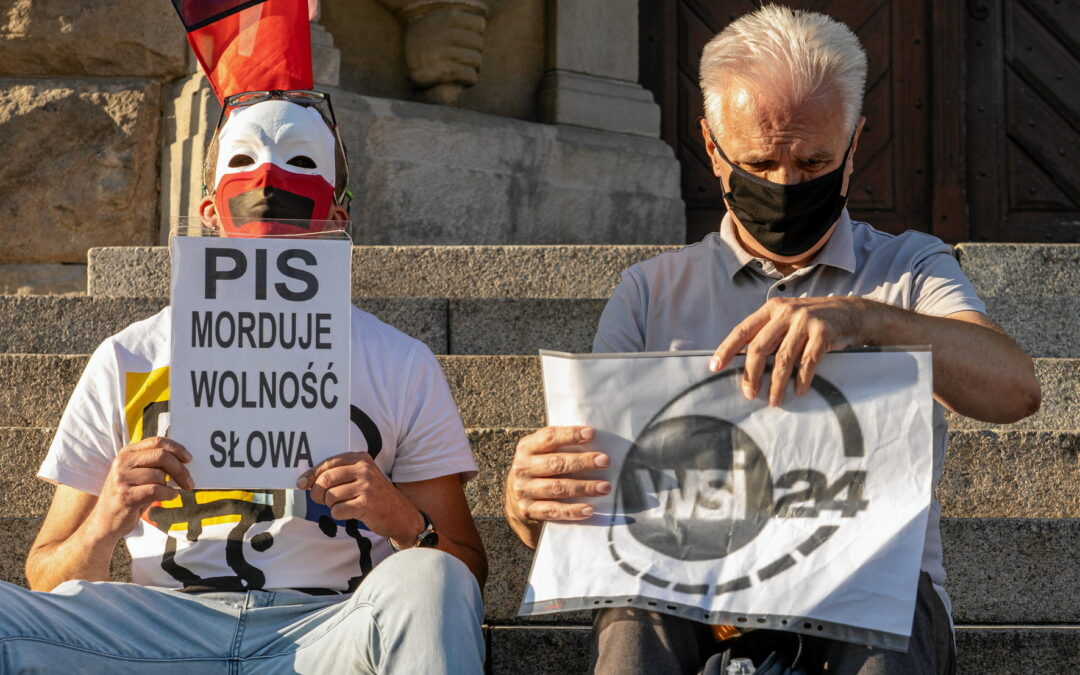Reporters Without Borders (RSF) has declared a “press freedom state of emergency” in Poland. Its decision comes in response to the barring of journalists from visiting the border with Belarus and a proposed law that would change the ownership of the country’s largest private broadcaster.
The Paris-based NGO, whose mission is to promote and defend independent journalism and access to information, has already repeatedly raised concern over media freedom in Poland.
Since the current national-conservative Law and Justice (PiS) government came to power in 2015, Poland has fallen from its highest ever position of 18th in RSF’s annual World Press Freedom Index to its lowest ever ranking of 64th this year.
Speaking in Warsaw, RSF’s Pavol Szalai noted the recent decision by the president – at the request of the government – to introduce a state of emergency on the border with Belarus amid a surge in illegal crossings. This includes a ban on non-residents entering the area and on taking images of border infrastructure.
As a result, the media have been unable to report from there. Shortly after the state of emergency went into effect, two journalists from Onet, Poland’s biggest online news portal, were charged by police for visiting the emergency zone.
RSF, as well as Amnesty International, have previously raised concern over that incident, and Szalai has now repeated their call for the authorities to end such restrictions. Today, a large group of Poland’s leading media outlets also published a joint appeal to end the ban on journalists reporting from the border.
Szalai also criticised a law proposed by PiS to restrict foreign media ownership. It would force American company Discover to sell its majority stake in TVN, a large television network that is often critical of the government.
“Attacking TVN means attacking press freedom in Europe,” Szalai declared. PiS’s “clear objective is…to weaken and then take control of the biggest source of independent news in this major EU country”.
He appealed to parliament to stop the bill, or else for the president to veto it. Last week the legislation was rejected by the opposition-controlled Senate but can still be pushed through by a majority in the lower-house Sejm, where PiS is the largest party.
The government has argued that the law is simply an effort to end a loophole that allows firms to evade existing restrictions on ownership of Polish media by firms from outside the European Economic Area.
It claims that such measures are necessary to prevent entities from places such as Russia and China from buying Polish media. PiS chairman Jarosław Kaczyński also claimed that it would stop “narco-businesses” from buying outlets to “launder dirty money”.
Earlier this month, the prime minister, Mateusz Morawiecki, said that TVN is “not free media” and warned that foreign-owned outlets are used “against us” by their countries of origin. A deputy leader of PiS called the broadcaster a “pro-Russian propaganda station created from the Soviet intelligence agency”.
Speaking in Warsaw, Szalai also noted that “public media have become party channels” for PiS and that Poland’s largest network of regional newspapers was recently purchased by state oil giant Orlen, resulting in the replacement of many editors with figures sympathetic towards the government.
“Independent media are dragged through the courts,” added Szalai, referring to almost 200 lawsuits launched by politicians and state entities against media outlets and journalists. He also noted that “reporters were attacked by police” at protests last year.
PiS has pursued a policy it calls “repolonisation” of the media, meaning a reduction in foreign ownership. The party argues that it is in Poland’s national interest for outlets to be domestically owned. Critics, however, see it as an effort to bring the media under the control of state entities and PiS allies.
Supporters of PiS also claim that public media in Poland have always been under the influence of whichever party is in power, and that the current conservative slant helps to balance out a media landscape previously dominated by more liberal outlets.
They also argue that private media were far from free under the previous government. In 2014, for example, security agents raided the offices of news magazine Wprost, using physical force to seize material as part of an investigation into the publication of secret recordings that had embarrassed the government.
Main image credit: Arkadiusz Stankiewicz / Agencja Gazeta
We would like to know what you think about our service so that we can keep improving Notes from Poland. The survey will take you just 5 minutes but will provide us with valuable feedback. Thank you for your time!
Notes from Poland Readers’ Survey

Daniel Tilles is editor-in-chief of Notes from Poland. He has written on Polish affairs for a wide range of publications, including Foreign Policy, POLITICO Europe, EUobserver and Dziennik Gazeta Prawna.




















